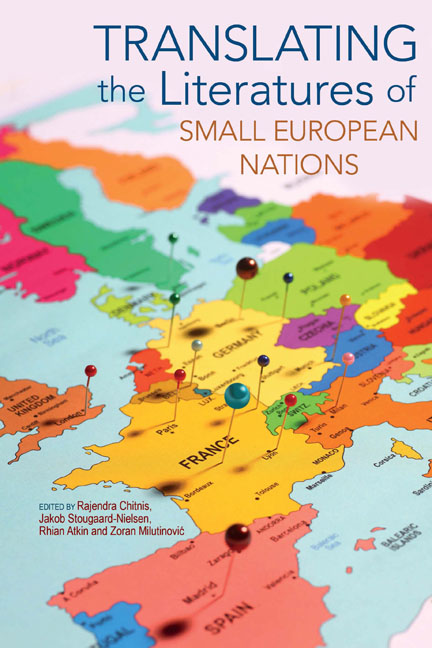Book contents
- Frontmatter
- Contents
- Acknowledgements
- Introduction
- 1 The Global Presentation of Small National Literatures: South Slavs in Literary History and Theory
- 2 Translators as Ambassadors and Gatekeepers: The Case of South Slav Literature
- 3 Supply-driven Translation: Compensating for Lack of Demand
- 4 Literature as Cultural Diplomacy: Czech Literature in Great Britain, 1918–38
- 5 Exporting the Canon: The Mixed Experience of the Dutch Bibliotheca Neerlandica
- 6 Creative Autonomy and Institutional Support in Contemporary Slovene Literature
- 7 Strategies for Success? Evaluating the Rise of Catalan Literature
- 8 Gender, Genre and Nation: Nineteenth-century Swedish Women Writers on Export
- 9 Translating as Re-telling: On the English Proliferation of C.P. Cavafy
- 10 Criminal Peripheries: The Globalization of Scandinavian Crime Fiction and Its Agents
- 11 Literary Translation and Digital Culture: The Transmedial Breakthrough of Poland's The Witcher
- 12 Towards a Multilingual Poetics: Self-translation, Translingualism and Maltese Literature
- 13 Does Size Matter? Questioning Methods for the Study of ‘Small’
- Coda: When Small is Big and Big is Small
- Index
12 - Towards a Multilingual Poetics: Self-translation, Translingualism and Maltese Literature
- Frontmatter
- Contents
- Acknowledgements
- Introduction
- 1 The Global Presentation of Small National Literatures: South Slavs in Literary History and Theory
- 2 Translators as Ambassadors and Gatekeepers: The Case of South Slav Literature
- 3 Supply-driven Translation: Compensating for Lack of Demand
- 4 Literature as Cultural Diplomacy: Czech Literature in Great Britain, 1918–38
- 5 Exporting the Canon: The Mixed Experience of the Dutch Bibliotheca Neerlandica
- 6 Creative Autonomy and Institutional Support in Contemporary Slovene Literature
- 7 Strategies for Success? Evaluating the Rise of Catalan Literature
- 8 Gender, Genre and Nation: Nineteenth-century Swedish Women Writers on Export
- 9 Translating as Re-telling: On the English Proliferation of C.P. Cavafy
- 10 Criminal Peripheries: The Globalization of Scandinavian Crime Fiction and Its Agents
- 11 Literary Translation and Digital Culture: The Transmedial Breakthrough of Poland's The Witcher
- 12 Towards a Multilingual Poetics: Self-translation, Translingualism and Maltese Literature
- 13 Does Size Matter? Questioning Methods for the Study of ‘Small’
- Coda: When Small is Big and Big is Small
- Index
Summary
Two male crabs Dos jueyes machos no caben
can't root in the same lair dentro de una misma cueva
Rosario Ferré, Language Duel/Duelo de Lenguaje, 2002, 2–3In her bilingual text Language Duel/Duelo de Lenguaje (2002), the Puerto Rican writer, Rosario Ferré (1938–2016), dramatizes the contest between English and Spanish in the Americas. This war is so fierce and loud, with cannonballs roaring above, that the advantages of taking a double perspective seem inaudible for these ‘two male crabs’ interlocked in an ever-lasting power struggle for linguistic dominance. We can observe this linguistic power struggle not only in the Americas, but globally, and with shifting and more complicated power dynamics when the struggle becomes one between minority and majority languages, as in Europe. Cronin (2003, 139) shows how the postcolonial critique of Europe's role in history as colonizer often tends to ‘reduce Europe to two languages, English and French, and to two countries, England and France’. He cites Niranjana's references to ‘European descriptions’ and ‘European languages’, which aptly expose the double pall of invisibility that minority cultures and languages experience (Cronin, 2003, 140). In telling Europe's story as one single story, postcolonial critics risk homogenizing languages, cultures and experiences, thus reducing them to ‘invisible minorities’ (139). The single story, the one that does not study specificity, as Chimamanda Adichie (2009) warns, risks creating and perpetuating stereotypes (see also Tanoukhi, 2013). What is being perpetuated here is an essentialist narrative of Europe as a colonialist’s narrative, which renders invisible the story of a post-colony within Europe. It also renders invisible Europe's multicultural experiences, not only beyond borders (e.g. the diaspora) but also within them, as exemplified by Malta, a small Mediterranean island-state that is generally absent from such debates.
The absence of smaller literatures from scholarly debates or in translation can render that literature invisible. Joseph Brincat (2011, 34) illustrates this well in his history of Maltese linguistics, in which he identifies contemporary translations of an ancient Arabic text, Kitābar-Rawḍ al-Mitar (The Book of Fragrant Gardens) that exclude the sections about Malta. For Brincat, these exclusions make it more difficult to trace the origins of the Maltese language, the only European language that is part-Semitic, part-Romance.
- Type
- Chapter
- Information
- Translating the Literatures of Small European Nations , pp. 227 - 246Publisher: Liverpool University PressPrint publication year: 2019



